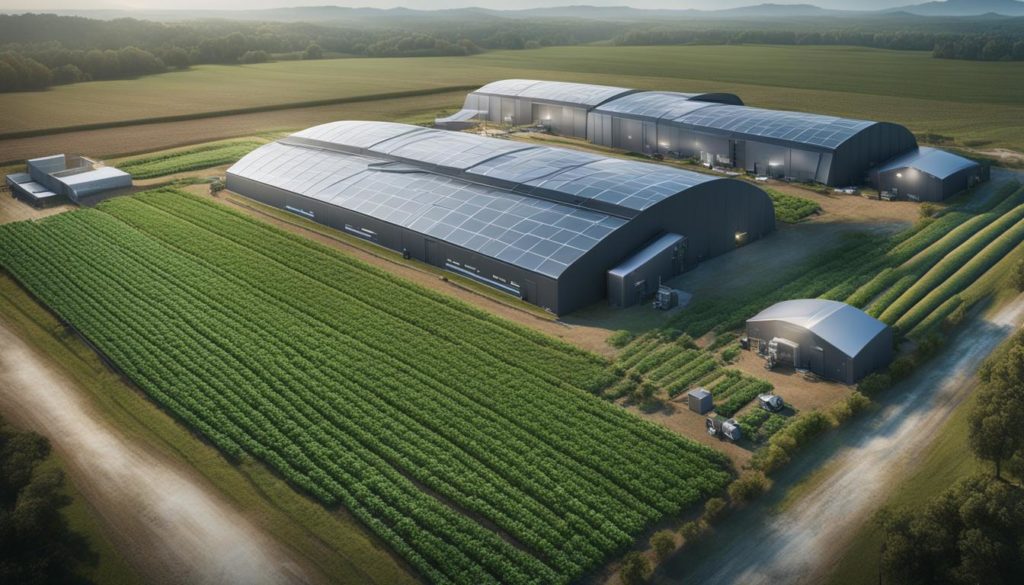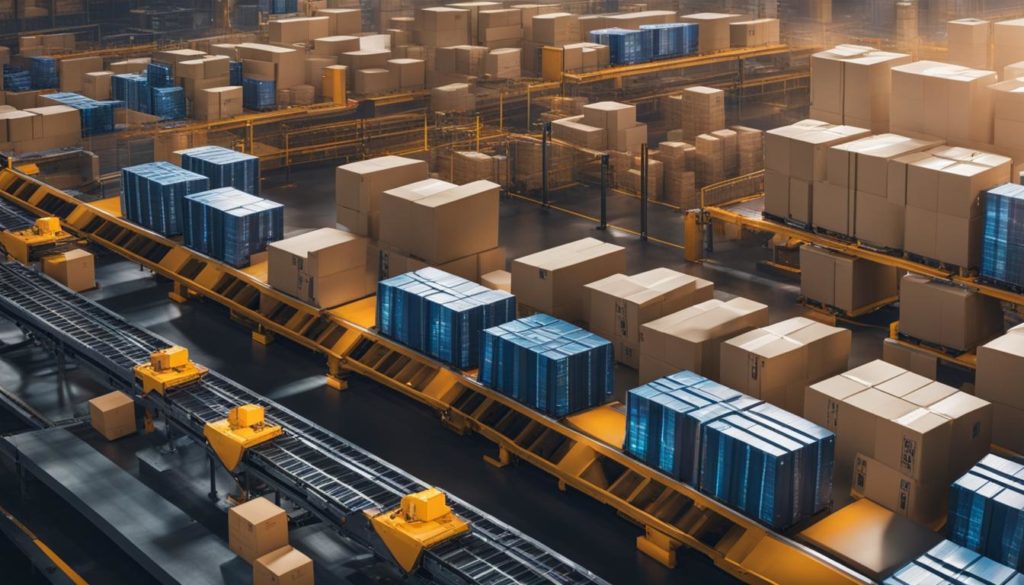In today’s globalized food industry, ensuring the purity and safety of our food supply is of utmost importance. Contamination and foodborne illnesses pose significant risks to public health, leading to hundreds of thousands of deaths each year. To address these challenges, technological advancements such as Artificial Intelligence (AI) and Blockchain are playing a crucial role in improving food traceability and safety.
AI has the potential to revolutionize the agricultural value chain by enabling remote monitoring and providing insights into microorganism interactions. By harnessing AI, farmers and food producers can proactively identify and address potential safety breaches, reducing the risk of contamination and ensuring the quality of food. On the other hand, Blockchain technology offers transparency, traceability, and monitoring capabilities throughout the supply chain. With Blockchain, consumers can have confidence in the origin and authenticity of the food they consume.
The adoption of AI and Blockchain in the food industry paves the way for sustainable and safe food traceability. It not only reduces contamination and the need for mass recalls but also promotes responsible consumption. By leveraging these technologies, we can build a more secure and transparent food system that safeguards the health and well-being of consumers.
Key Takeaways:
- Sustainable food traceability is crucial for ensuring the safety and purity of our food supply.
- AI enables remote monitoring and insights into microorganism interactions to proactively address safety breaches.
- Blockchain technology provides transparency, traceability, and monitoring capabilities throughout the food supply chain.
- The adoption of AI and Blockchain can lead to fewer contamination risks and mass recalls.
- By embracing these technologies, we can promote responsible consumption and secure the purity of our food supply.
Importance of Food Safety Regulatory Bodies
Food safety regulatory bodies play a crucial role in ensuring the global food supply is safe for consumption. With the increase in contamination risks and health scares, regulatory bodies in developed countries have implemented strict compliance measures to protect consumers from foodborne illnesses. These bodies, such as the FDA in the US, EFSA in Europe, and CFIA in Canada, are responsible for setting and enforcing regulations that promote safe and responsible food production, processing, and distribution.
One of the main challenges faced by the food industry is the globalization of the supply chain, which has made it difficult to trace the source of foodborne illnesses. Regulatory bodies help address this issue by implementing measures to monitor and control the safety of imported and domestically produced food. By ensuring compliance with food safety regulations, they contribute to global food safety and traceability, providing consumers with confidence in the safety of the foods they consume.
Agritech opportunities further strengthen the role of regulatory bodies in improving food safety. The adoption of advanced technologies, such as artificial intelligence and blockchain, can enhance different stages of the agriculture value chain, including production, processing, packing, distribution, storage, and preparation. By embracing these technologies and promoting their integration, regulatory bodies can ensure that safe food production practices are followed, leading to a safer and more sustainable food system.
Importance of Food Safety Regulatory Bodies
“Food safety regulatory bodies have a vital role in protecting consumers from foodborne illnesses and contamination risks. By implementing strict compliance measures, these bodies ensure that food production, processing, and distribution adhere to the highest safety standards. Through their efforts, consumers can have confidence in the safety and quality of the foods they consume.”
| Role of Food Safety Regulatory Bodies | Benefits |
|---|---|
| Setting and enforcing food safety regulations | Ensures compliance and adherence to safety standards |
| Monitoring and controlling imported and domestically produced food | Reduces the risk of contamination and foodborne illnesses |
| Promoting the adoption of advanced technologies | Enhances food safety and traceability in the supply chain |
Impact of Artificial Intelligence (AI) on Food Safety
Artificial Intelligence (AI) is playing a significant role in transforming the agriculture industry and improving food safety. One area where AI is making a notable impact is through autonomous farming equipment. These advanced machines incorporate sophisticated AI systems and sensor technologies, enabling them to understand the farm environment and the needs of farm owners. This leads to improved safety and quality of agricultural produce.
AI also has the potential to enhance food safety by understanding microorganism interactions within an environment. By analyzing data from sensors and other sources, AI can identify potential safety breaches and help prevent contamination. For instance, IBM has partnered with Cornell University to use AI in dairy research, ensuring the safety of the global milk supply. These advancements in AI technology have the potential to revolutionize food safety practices and ensure the purity of our food supply.
“AI is not just helping in automation; it is also helping us understand and predict the complex interactions between microorganisms and the farm environment. This knowledge allows us to take preventive measures and ensure food safety.” – Dr. Mark Mattingly, Agricultural Scientist.
The adoption of AI in agriculture has opened up new opportunities to increase food safety and traceability. By harnessing the power of AI, farmers and regulatory bodies can monitor crop health, detect anomalies, and prevent safety breaches. The implementation of AI-driven technologies in the agriculture industry is a significant step towards ensuring the responsible consumption of safe and high-quality food.

Emerging Applications of AI in Food Safety
AI is finding various applications in food safety beyond autonomous farming equipment. For example, AI-powered systems can analyze vast amounts of data and identify patterns that indicate potential food safety risks. This can help regulatory bodies and food manufacturers in implementing proactive measures to prevent contamination and improve overall food safety.
In addition, AI can be used to develop predictive models that forecast the likelihood of foodborne illnesses or identify potential hazards before they occur. These models, coupled with real-time monitoring, can enable quick response and intervention, reducing the impact of food safety issues on public health.
As AI continues to evolve, its potential in enhancing food safety and traceability becomes even more promising. With ongoing research and innovation, AI-driven solutions can revolutionize the way we ensure the safety and purity of our food supply.
The Role of Blockchain in Food Production and Supply Chains
Blockchain technology has emerged as a game-changer in the food industry, revolutionizing food production and supply chains. With its ability to create a transparent and immutable ledger, blockchain ensures traceability and enhances the security of transactions. It has the potential to address key challenges in the food industry, such as food fraud, supply chain inefficiencies, and lack of trust.
Transparency and traceability are crucial factors in ensuring the safety and quality of food products. Blockchain enables the tracking of every step in the food supply chain, from farm to table. By recording every transaction and movement of goods, blockchain provides a decentralized and tamper-proof system that enhances trust and accountability.
Moreover, blockchain technology can facilitate secure transactions in the food industry. With traditional supply chains often plagued by inefficiencies and delays, blockchain offers a more streamlined and secure process. By eliminating the need for intermediaries and automating processes, blockchain can significantly reduce costs and enhance efficiency in the food production and supply chain.
| Benefits of Blockchain in the Food Industry | Details |
|---|---|
| Transparency and Traceability | Blockchain enables the tracking of every step in the food supply chain, ensuring transparency and traceability. |
| Enhanced Security | With its decentralized and tamper-proof nature, blockchain enhances the security of transactions in the food industry. |
| Cost Reduction | By eliminating intermediaries and automating processes, blockchain can significantly reduce costs in food production and supply chains. |
The adoption of blockchain in food production and supply chains has the potential to create a more transparent, efficient, and secure food system. By ensuring traceability and accountability, blockchain can help build consumer trust and promote responsible consumption. It is clear that blockchain is poised to play a critical role in shaping the future of the food industry.
The Potential of AI and Blockchain in Food Safety
AI and Blockchain technologies have the potential to revolutionize food safety by enhancing traceability, promoting responsible consumption, and ensuring farm safety. By leveraging AI, stakeholders in the food industry can monitor and analyze crop health, detect anomalies, and ensure compliance with regulations. This can lead to early identification of safety breaches and reduce the risk of contamination and mass recalls.
Blockchain, on the other hand, can provide transparency and traceability throughout the entire food supply chain. It allows for secure recording and sharing of data, ensuring that information about the origin, production, and distribution of food is accurate and tamper-proof. With blockchain, consumers can have confidence in the safety and authenticity of the products they consume.
The combination of AI and Blockchain in food safety can bring numerous benefits. It enables real-time monitoring, automated data collection, and predictive analytics, which can help prevent foodborne illnesses and ensure the purity of the food supply. These technologies also provide opportunities for stakeholders to collaborate and share knowledge, leading to continuous improvements in food safety practices.
Table: Potential Applications of AI and Blockchain in Food Safety
| Application | Potential Benefits |
|---|---|
| Monitoring crop health | Early detection of diseases or pests, leading to improved farm safety |
| Ensuring compliance with regulations | Reduced risk of safety breaches and contamination |
| Detecting anomalies in the food supply chain | Improved traceability and identification of potential risks |
| Preventing unauthorized modifications of data | Increased transparency and trust in the food system |
As the adoption of AI and Blockchain in the food industry continues to grow, it is crucial to address challenges such as scalability, security, and privacy risks. However, the immense opportunities presented by these technologies far outweigh the challenges. The future of food safety lies in the integration of AI and Blockchain, which can create a more secure, transparent, and sustainable food system for all.
Challenges and Opportunities in Implementing AI and Blockchain in Food Safety
The implementation of AI and Blockchain in food safety presents both challenges and opportunities for the industry. While these technologies have the potential to revolutionize traceability and enhance food safety, there are several key hurdles that need to be addressed for successful adoption.
The Challenges:
- Scalability: Scaling AI and Blockchain solutions to accommodate the vast amount of data generated in the food industry can be a significant challenge. The infrastructure and computational power required to handle this data need to be robust and efficient.
- Security: Ensuring the security and integrity of data within AI and Blockchain systems is crucial. Protecting against cyber threats and unauthorized access is essential to maintain trust in the food supply chain.
- Privacy Risks: As AI and Blockchain involve the collection and sharing of data, there are concerns regarding privacy. Safeguarding consumer information and ensuring compliance with data protection regulations is of utmost importance.
Other challenges include energy consumption, interoperability with existing systems, implementation cost, lack of standardization and regulations, and the scarcity of skilled developers. Overcoming these challenges will require collaboration between industry stakeholders, regulatory bodies, and technology providers to develop best practices, standards, and guidelines for the adoption of AI and Blockchain in food safety.
The Opportunities:
Despite the challenges, the potential benefits of implementing AI and Blockchain in food safety offer immense opportunities for the industry. These technologies can provide real-time monitoring, predictive analytics, and traceability, leading to improved food safety standards and reduced contamination risks.
“The adoption of AI and Blockchain in the food industry can revolutionize traceability and create a more transparent and secure food system.”
AI can enable remote monitoring of crop health and microorganism interactions, helping detect anomalies and prevent safety breaches. Meanwhile, Blockchain can enhance transparency and traceability throughout the entire supply chain, ensuring the authenticity and origin of food products.
By addressing the challenges and leveraging the opportunities presented by AI and Blockchain, the food industry can strengthen its food safety infrastructure, promote responsible consumption, and ensure the purity and safety of the global food supply.
The Role of Emerging Technologies in Building Intelligent Supply Chains
Emerging technologies such as IoT, AI, and Blockchain are revolutionizing the food industry by building intelligent and transparent supply chains. These technologies play a pivotal role in ensuring the safety, traceability, and efficiency of the food supply chain. IoT devices deployed throughout the supply chain enable real-time data collection and monitoring, providing valuable insights into the environment, processes, and product status. AI leverages this data to predict future events, analyze trends, and optimize supply chain operations, ultimately leading to improved transparency and real-time monitoring.
Blockchain technology is another critical component of building intelligent supply chains. It ensures transparency and trust by securely recording and sharing supply chain data among multiple stakeholders. With its digital immutable ledger, Blockchain enhances traceability and control in food production and supply chains. It accurately traces the origins of raw materials and ingredients used in food production, enabling stakeholders to track the journey of a specific food item from the farm to the end consumer. This transparency promotes responsible consumption and instills confidence in the food system.
The integration of IoT, AI, and Blockchain technologies in the food industry brings several benefits. It facilitates data provenance, allowing stakeholders to verify the authenticity and integrity of data at each stage of the supply chain. Predictive analytics powered by AI helps identify potential risks and prevent issues such as contamination or spoilage. Additionally, real-time monitoring through IoT devices enables proactive decision-making and prompt corrective actions, ensuring the efficient flow of goods throughout the supply chain.
| Benefits of Emerging Technologies in Building Intelligent Supply Chains |
|---|
| Enhanced transparency and traceability |
| Real-time monitoring and data collection |
| Predictive analytics for risk prevention |
| Efficient flow of goods |
The adoption of emerging technologies in the food industry is vital for building intelligent supply chains that prioritize transparency, real-time monitoring, and traceability. These technologies offer immense opportunities to improve food safety, reduce waste, and provide consumers with reliable information about the products they consume. As the food industry continues to evolve, embracing IoT, AI, and Blockchain will become increasingly important for ensuring a secure, sustainable, and responsible food system.

Conclusion
In conclusion, the adoption of AI and Blockchain technologies holds great promise for the future of food safety and sustainable food traceability. These technologies offer innovative solutions to the challenges faced by the global food supply chain, such as contamination and foodborne illness. By leveraging AI, remote monitoring and insights into microorganism interactions can be achieved, leading to improved safety and quality of agricultural produce. Additionally, Blockchain provides transparency, traceability, and secure transactions, ensuring the integrity of the food production and supply chains.
Through the integration of AI and Blockchain, the food industry can establish a robust food safety infrastructure that minimizes contamination risks and reduces mass recalls. The use of AI and Blockchain technologies enables efficient monitoring of crop health, compliance with regulations, and detection of anomalies, contributing to responsible consumption and secure food supply. As ongoing research and development continue to demonstrate the value of these technologies, the future of food safety looks promising, with enhanced traceability and a more transparent food system.
In the coming years, the continued advancement and adoption of AI and Blockchain in the food industry will play a vital role in ensuring the purity and safety of the global food supply. Despite the challenges of scalability, security, and privacy risks, the potential benefits outweigh the obstacles. As the world becomes increasingly conscious of the importance of food safety and traceability, the implementation of AI and Blockchain technologies will be crucial for building a resilient and sustainable food system. By embracing these cutting-edge technologies, the food industry can pave the way for a safer, more secure, and responsible future of food production and consumption.
FAQ
What is the impact of AI and Blockchain on food safety?
AI and Blockchain have the potential to revolutionize food safety by enhancing traceability, ensuring transparency, and reducing contamination risks.
How can AI improve food safety?
AI can contribute to food safety by enabling remote monitoring, understanding microorganism interactions, and reducing the risk of safety breaches.
What role does Blockchain play in food production and supply chains?
Blockchain technology can enhance transparency, traceability, and control in food production and supply chains by accurately tracing the origins of raw materials and ingredients.
How can AI and Blockchain strengthen food safety infrastructure?
The combination of AI and Blockchain can lead to less contamination and fewer mass recalls by monitoring crop health, ensuring compliance with regulations, and preventing unauthorized modifications of information.
What are the challenges in implementing AI and Blockchain in food safety?
Challenges include scalability, security, privacy risks, energy consumption, interoperability, integration with legacy systems, implementation cost, lack of standardization and regulations, and scarcity of skilled developers.
How do emerging technologies contribute to building intelligent supply chains?
Emerging technologies such as IoT, AI, and Blockchain enable real-time data collection, predictive analytics, and secure sharing of supply chain data, leading to transparency, traceability, and efficient monitoring.
- Regulatory and Compliance: Pioneering the Future of Saudi Arabia’s Dedicated Cargo Airline - December 21, 2024
- Financial Strategies: Fueling the Growth of Saudi Arabia’s Dedicated Cargo Airline - December 20, 2024
- Operational Excellence: Ensuring Competitive Edge for Saudi Arabia’s Dedicated Cargo Airline - December 19, 2024






